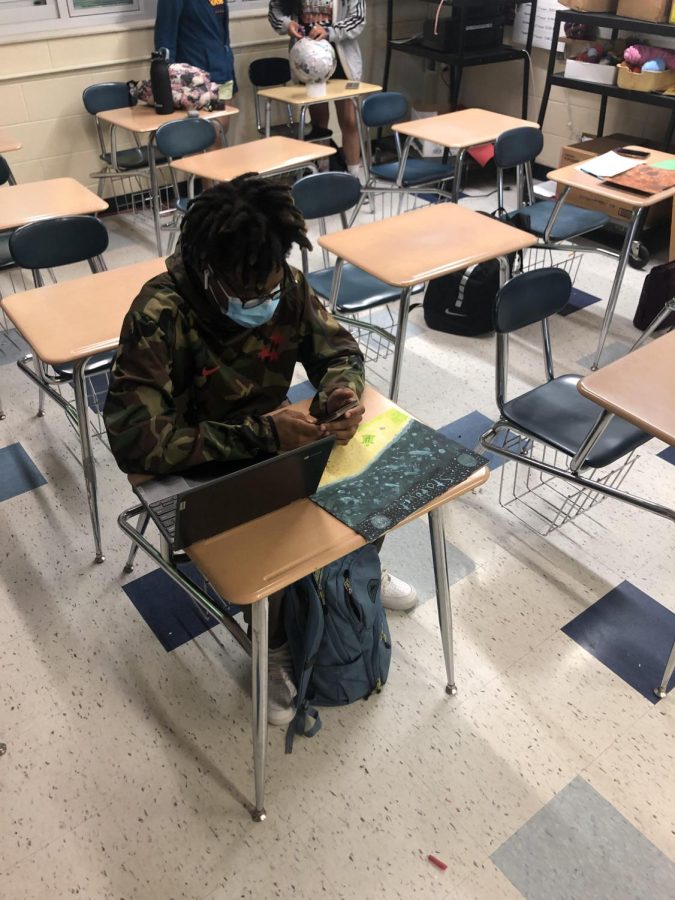Screen addictions negatively effect students
Credit: Fletcher Elsholz
Loy Norrix student checks their phone in class. Students and teachers alike have noticed the affect of the pandemic on this particular habit.
June 4, 2022
A lot of the time during class, a teacher will ask a question and no student will answer because they’re too busy on their phone.
In online school it was incredibly easy to not pay attention in class at all: students could leave their cameras off, mute their microphone and walk away from their computers and do anything but pay attention during class.
Oftentimes when someone was called on during online school, the student’s colored dot would sit silently and not give any response, which made an awkward feeling radiate through everyone’s screens until a brave soul would answer the question just to cut the tension.
Referring to studies showing grades before and after online and in-person school, Brookings reports, “Virtually all of these studies found that online instruction resulted in lower student performance relative to in-person instruction; although in one case, students with hybrid instruction performed similarly to their in-person peers.”
It feels as if this lack of attention and ignoring of the teacher is still happening in-person with children just staring at their phones, playing games, texting their friends, even answering FaceTime or watching TV shows in class. Many students have gotten accustomed to not having to answer questions in class or just doing whatever they want while a teacher drones on in the background. Phones have always been a distraction for many students, but it feels like the distraction has amplified in the classroom in recent years, especially because of the pandemic.
Many students as well as teachers have noticed this trend, such as senior Ryan Briggs who spoke about the change from online back to in-person school.
“It honestly doesn’t feel like it’s changed much. Schools are definitely using computers to do work instead of paper and pencil,” said Briggs.
With kids on their Chromebooks, it can look like they’re working while they’re really just playing a browser game or watching Youtube.
Another theoretical solution from Briggs would be to limit access to wifi.
“The staff could remove the wifi so only cellular data is available and only have routers in the cafeteria,” Briggs said.
Which would make it a lot harder to be able to use your phone all the time at school because they wouldn’t have access to wifi and they wouldn’t want to use all of their data.
Spanish teacher Christina Holmes thinks the problem can be solved by a change in attitude.
“I think there needs to be a societal change in expectation in how we behave on our phones,” Holmes continued, “Phones would be used as tools for both information and entertainment and would not interfere with face to face interactionIf you are are you if you don’t pass those classes graduate.”
This is a better solution to the problem because when the social norms changed at the start of the COVID lockdown, people felt like it was more acceptable to spend a ridiculous amount of time inside, staring at screens because you were “flattening the curve” and being heroic, but social norms haven’t shifted back. People are still living overwhelmingly sedentary lives and don’t want to leave the house, even with the low COVID numbers.
Then the question is how to enact some sort of social change to get people off their phones.
A lot of the time people talk about this issue on social media which ironically requires technology to use.People might feel an urge to really make a change to use their phones less, but it can be really challenging to give technology up.There are real benefits to lowering the amount of screen time you have in a day, especially at school. According to Emily Lippincott, a 2015 study done in London that covered 130 thousand students.
“The results found from this study found that a ban on phone use in school increased the school’s average test scores by 6.4%. This difference was just for regular students, and an even more significant increase in test score average was found in underachieving students, at 14%,” Lippincott said.
So the solution is pretty obvious, but it’ll be hard to accomplish. A lot of people find it very hard to limit the amount of time they spend on their phones. If a new standard for society could be that people spend time off of their phones while involved in interactions with others, rather than staring down at their phones, a lot of the academic and social issues would be fixed.













James Johnson • Jun 8, 2022 at 7:11 am
Teachers have the ability to lock screens, limit browsing to only certain sites, and monitor students’ screens during class. Many teachers don’t use this tool, but it was really helpful for me during online learning and I continue to use it this year.